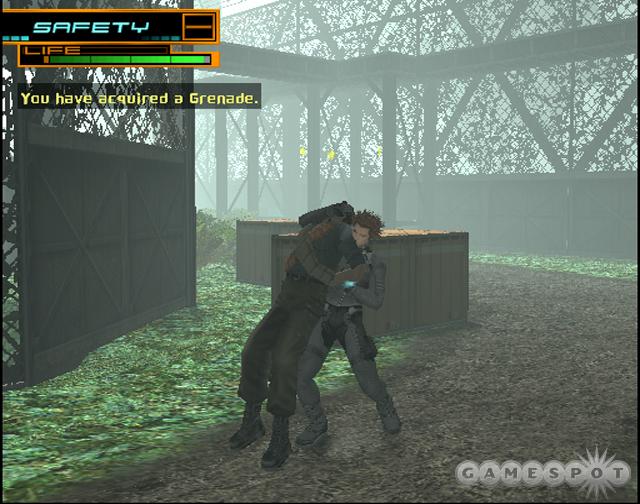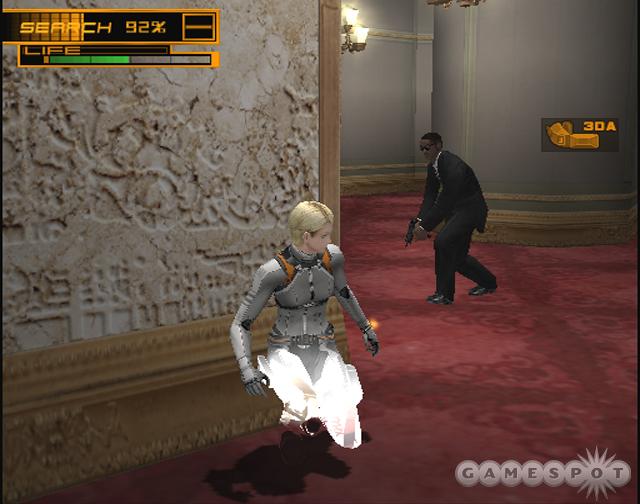Spy Fiction Designer Diary #1
We hear from Hidetaka "Swery" Suehiro, writer and director of Spy Fiction and cofounder of Access Games, and Brian Glazebrook, producer of Spy Fiction for Sammy Studios, in this exclusive diary.
Spy Fiction is an upcoming stealth action game being developed by Access Games and released in the US by Sammy Studios. The game mixes traditional stealth gameplay mechanics with a host of new gadgets and an animelike style to create a new experience for fans of the genre. In our first Spy Fiction designer diary, writer and director Hidetaka Suehiro and Sammy producer Brian Glazebrook talk about the concept and the inception of the project.
"What is Spy Fiction?"
By Hidetaka "Swery” Suehiro, writer and director of Spy Fiction and cofounder of Access Games, and Brian Glazebrook, producer of Spy Fiction for Sammy Studios.

Hidetaka "Swery" Suehiro:
Spy Fiction is a stealth action game. Playing as an agent of the elite Phantom Strike Force in an organization called SEA, you will save the world from the threat of an international terrorist organization. When we started the game, we asked ourselves, "What if we could become a spy?" Our goal became to turn that "what if" question into a reality for gamers. A group of us who share our love for games, movies, and entertainment decided to put together all of the elements that come to mind when you ask, "If I were a spy, what would I want to be able to do...?” and build a game based on it.
Brian Glazebrook:
Spy Fiction really captures the essence of being a spy, but a spy as seen in the movies. The game focuses less on real-world espionage and really turns its focus to the memorable moments we've seen in popular works of spy fiction. Abilities like being a master of disguise, infiltrating and blending into any group, being as deadly with your hands as with a weapon, and having access to gadgets galore--this is the experience we wanted to capture in a game. And of course, beautiful women--what's a spy story without beautiful women? In fact, one of our two playable characters is your classic "deadly but beautiful" agent.
Swery:
We began developing Spy Fiction in the beginning of 2002, while I was at DeepSpace working on a game called "Extermination." It was my first experience in game production. I think the game turned out pretty well; however, I wasn't 100 percent satisfied. I increased my fighting spirit for the next project. After Extermination, I began planning a game that I really wanted to make in my spare time. Around this time, a few of our staff members were thinking of becoming independent to create our ideal game. This is how we formed Access Games and how Spy Fiction was started. (Some other time, I will talk about my difficulty of starting up a new company...)
From the beginning of the project, we knew in what direction we wanted to take Spy Fiction, and that was to make it a 3D action game. The only thing left to decide was the theme. At the time, I already had an idea in mind to make this the ultimate spy game. When I think back, convincing the team was my first mission! Some of them were skeptical about a spy theme, so whenever I had a chance--during meetings, at lunchtime, or even after hours at bars--I was always talking about how great spies are and how a spy game can make a great action game.

Glazebrook:
When Access Games first presented Spy Fiction to us at Sammy Studios, we were instantly taken aback by the way it approached its spy premise. What I first noticed were the spy gadgets in the game. For instance, the agents in the game are equipped with a transparent camouflage suit that renders your character completely invisible. When used with a 3D camera, it lets you steal and assume other characters' identities; you can actually assume the identity of any character you encounter in the game. I was blown away by this--it was a total twist on what has become almost a stereotype in current spy games. To me, this suit was like something out of sci-fi, but only because I've become accustomed to seeing games where every device and tool needs to somehow be based in reality. Spy Fiction reminded me that games, even an espionage game set right here on Earth, can be all about fantasy. In our effort to strive for realism, too many games try to create experiences too married to reality, sometimes at the expense of being fun. Spy Fiction is all about the most fun aspects of being a spy.
Swery:
Once we settled on the spy theme, Spy Fiction's key features were added and eventually led to their present form (optical camouflage, disguising system, and so on). We were especially focused on not losing the spy essence while ensuring that Spy Fiction is not a simulation; it is pure entertainment. So we focused on making a fun game, being stylish, and creating a grand and imposing spy experience. The spy image in this title is different from the real-life spy who sneaks around. In Spy Fiction you infiltrate using the disguise system and gadgets designed to deceive the eye of the enemy. You're smooth, you're deadly, you're fearless--you're the kind of spy you've always yearned to be on the screen.
Got a news tip or want to contact us directly? Email news@gamespot.com
Join the conversation